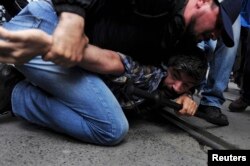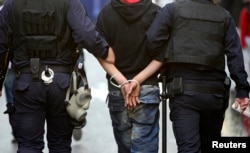U.S.-based Human Rights Watch has called on the Turkish government to act following a spate of abductions.
In a letter to Justice Minister Abdulhamit Gul, the rights group called for an "urgent and effective investigation of the abduction and possible enforced disappearances of at least four men in Ankara since March 2017."
"As far as we can tell, there has not been an effective investigation," said Emma Sinclair-Webb, senior Turkey researcher for Human Rights Watch. "The cases we've looked at were people abducted in broad daylight in front of witnesses.
"There is a lot of evidence to investigate. We got security camera images in one recent case in June. A man was abducted in front of his 8-year-old son, as well as local shopkeepers, and there is no excuse not to investigate."
Neither the government nor Justice Ministry has commented on the disappearances. Human Rights Watch said there were suspicions of state collusion. The abductees had all lost their jobs in a purge against followers of U.S.-based Turkish cleric Fethullah Gulen, who is blamed for a failed coup last year in Turkey. The circumstances of the abductions were similar, with all the people taken by masked men using a black Volkswagen transit van.
One of the four who disappeared, Onder Asan, subsequently turned up in police custody after his abductors held him for 42 days, during which he said he was tortured. The government has strongly rejected claims of torture and abuse.
Earlier this year, the government reduced from 30 days to seven the period during which a person can be held without charge, under the emergency rule introduced after the failed coup.
Longer interrogations
Human Rights Watch warned that the abductions could be an effort to circumvent the reform. "We are assuming that these people are being held to interrogate people for a longer period," said Sinclair-Webb. She also said abductions are uniquely cruel and that the European Court of Human Rights ruled they were tantamount to torture of family members of those who disappeared.
While Human Rights Watch cited four cases and said it was investigating a fifth, it acknowledged the number was most likely higher, with local Turkish rights groups and opposition parties noting other ones.
The specter of people being dragged off the streets into unmarked cars evokes memories of one of Turkey's darkest chapters. During the 1990s, at the height of war by the Turkish state against the Kurdish rebel group PKK, a period characterized by gross human rights violations, hundreds of activists and civilians disappeared at the hands of the security forces. Most either turned up dead several months later, their bodies usually showing signs of torture, or were subsequently discovered in mass graves years afterward. Many of those who went missing were last seen being taken away in white Renaults, used then by security forces. The car became synonymous with abductions.
When President Recep Tayyip Erdogan served as prime minister, his government had been in the forefront of ending torture. During his early years in power, groundbreaking investigations and trials were initiated against security members accused of being involved in the 1990s abductions. Human Rights Watch, however, pointed out there were only two convictions out of hundreds of cases.
The latest spate of abductions, while relatively few compared with the past, is adding to fears the country is sliding back to the past. "We've seen Turkey has a very notorious past in which people 'were disappeared' by the state," Sinclair-Webb said. "We don't want to see Turkey return to that pattern, so it's very important Turkey stamps these [abductions] out."
Kurds' allegations
Concerns about Turkey going back to the past have been heightened by images on social media of people from Turkey's predominantly Kurdish southeast showing signs of abuse alleged to have been carried out by security forces. The government denies the allegations.
Musa Citil stood trial in 2014 but was acquitted of kidnapping and killing 13 Kurdish villagers during the 1990s, when Citil was an Ankara district gendarmerie commander. The families of those killed are appealing the acquittal to Turkey's Supreme Court. Meanwhile, Citil won a controversial promotion this month to major general.
Human rights advocates say their ability to stem deteriorating human rights is being weakened because they are being blocked by the post-coup crackdown.
"None of us has security in Turkey," said Amnesty International Turkey researcher Andrew Gardner. "These activities we take on a normal basis. If all these are criminalized, it means next week it could be me that is detained, someone from Human Rights Watch, someone from Turkey's Human Rights Association."
Several days ago, 30 more activists, including two senior members of the Turkey Human Rights Association, were detained on anti-terror charges. On Tuesday, all were released, pending trial, after giving statements to an Istanbul court.







